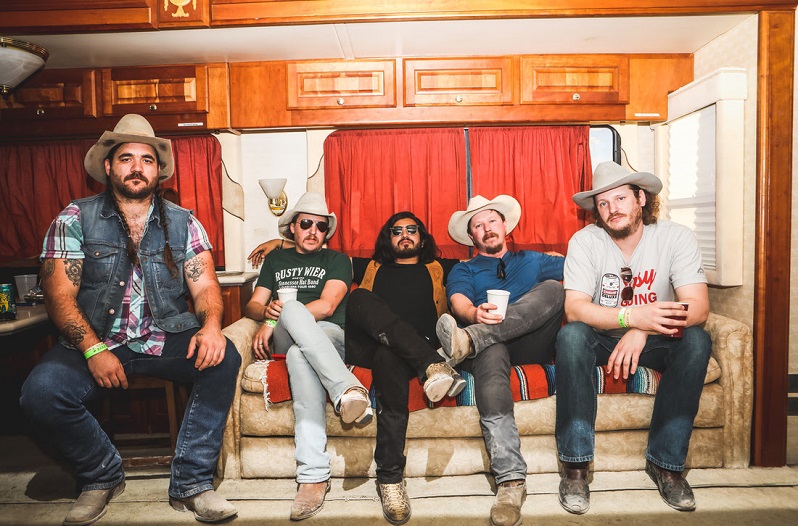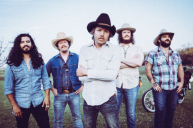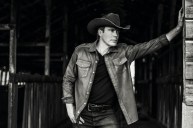More than the unadvertised release today (Aug. 2) of new Mike & the Moonpies album Cheap Silver and Solid Country Gold will catch fans by surprise. The collection of songs recorded at Abbey Road Studios in London and accompanied by the London Symphony Orchestra stray slightly from the Prairie Rose, musically and geographically, while building off the band's recent success.
It's a daring departure from the 2018 dance hall celebration Steak Night at the Prairie Rose. That album took the group from hard-working underdogs to critically acclaimed regulars on "artists to watch" lists. By shaking things up instead of playing it safe, Mike & the Moonpies establish themselves as a band able to adapt its songwriting to a different setting and supporting cast without completely shunning its Texas roots.
Wide Open Country recently chatted with singer-songwriter Mike Harmeier about the album's creation, its highbrow special guests and the story these songs tell about a Texas band's departure from its comfort zone.
WOC: The beginning of opening track "Cheap Silver" almost has this Electric Light Orchestra feel. It's easy listening, too. So, it doesn't start out like your typical Texas country album—Not that that'd be a bad thing. Were you trying to throw a curveball at the beginning?
Harmeier: We basically wanted everyone to know at the beginning of the record that it was going to be something different than they'd heard before. And we have the whole London Symphony on the entire record, so we wanted to introduce them early on. It set the tone for the rest of the record.
From there, some of the songs like "Young in Love" have an AM gold feel to them and a '70s country vibe. Were you looking back to the '70s fondly, as far as country and rock goes?
I wanted to use songs that had chord changes that'd work real well with the symphony, and that song has those major sevens. It's real jazzy and kind of a crooner, Sinatra type thing. I wanted to lean that way on it, and the countrypolitan aspect comes into play a lot more on those ballads.
How did you end up working with a symphony?
When we were going to Abbey Road, they were there the whole time. They're always in there doing scores. (Adam Odor) runs the studio that we usually record at in Wimbley, Texas at the Yellow Dog. He'd worked with the symphony before and knew how to go about it. He charted out all the symphony stuff and wrote all the string parts and arrangements.
We had to go in and record all the songs first, and then the symphony came in and played. We demoed stuff out, and he wrote all the strings for it. (The symphony) came in and played the stuff the day after we finished cutting all of our stuff at Abbey Road.
Were you hands-on at all with the symphony, or did they record their part and you found out how it sounded after the fact?
When he was arranging the strings, he'd do some MIDI versions so I could hear what he was planning on doing. I never got to hear it all in perspective until the day after they'd cut it because we had to fly out of London to play a show in Montana. I didn't get to hear the actual strings until a couple of days later. That's when it all kind of tied together for me.
If you're going to trust somebody with your songs, it should be the London Symphony Orchestra.
Absolutely. It was a really intense experience because they had to come in and they do three or four songs at a time, and then they have a new set of string players come in and do it. I'd never worked in a situation where it's unionized musicians. It was a very high-level recording process I hadn't been a part of before, so that was really cool to do.
Was it easy for you to leave someone else in charge of your songs?
I originally met our producer, Adam Odor, when he mixed our live record from the Winstar. He did the Steak Night record, obviously. He's become part of this band. He's like our other member. He's managing with us and everything. I trust him whole-heartedly. I put all of my faith in Adam, no matter what.
As the album goes on and you get to "Fast as Lightning" and the cover of "London Homesick Blues," it has more of that modern Texas country feel at that point.
I obviously wanted to end the record with "London Homesick," but I put "Fast as Lightning" late because I wanted the record to tell a story of us trying out this new style and new way of arranging our songs. At the very end of the record, we let everyone know that we're still that country band. We're experimenting, but we still do what we always set out to do.
This is probably super obvious, but did you pick "London Homesick Blues" because you're in London, but you're singing songs from Texas?
It was a given from when we decided to do the record at Abbey Road that we knew we were going to record that song. It says everything about what our record is saying. We're a Texas band over in London making this album. It ties the whole thing together, so we made this minory, sad version of it. I feel like that's how Gary P. Nunn wrote that song. It's a sadder song than it has been recorded in the past. We try to capture the melancholy of it.
One last thing, will there be a vinyl release for us collectors?
We're going to start off with the digital release, and then we're going to start pre-orders for our vinyl after everyone's heard the album. It's kind of like an art piece, so we have really immaculate packaging for the vinyl. It's something people are really going to want as a collector's item.
Now Watch: Songs Every Bruce Robison Fan Knows By Heart




